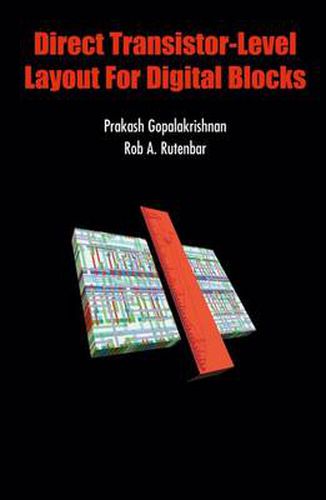Readings Newsletter
Become a Readings Member to make your shopping experience even easier.
Sign in or sign up for free!
You’re not far away from qualifying for FREE standard shipping within Australia
You’ve qualified for FREE standard shipping within Australia
The cart is loading…






This title is printed to order. This book may have been self-published. If so, we cannot guarantee the quality of the content. In the main most books will have gone through the editing process however some may not. We therefore suggest that you be aware of this before ordering this book. If in doubt check either the author or publisher’s details as we are unable to accept any returns unless they are faulty. Please contact us if you have any questions.
Cell-based design methodologies have dominated layout generation of digital circuits. Unfortunately, the growing demands for transparent process portability, increased performance, and low-level device sizing for timing/power are poorly handled in a fixed cell library.
Direct Transistor-Level Layout For Digital Blocks proposes a direct transistor-level layout approach for small blocks of custom digital logic as an alternative that better accommodates demands for device-level flexibility. This approach captures essential shape-level optimizations, yet scales easily to netlists with thousands of devices, and incorporates timing optimization during layout. The key idea is early identification of essential diffusion-merged MOS device groups, and their preservation in an uncommitted geometric form until the very end of detailed placement. Roughly speaking, essential groups are extracted early from the transistor-level netlist, placed globally, optimized locally, and then finally committed each to a specific shape-level form while concurrently optimizing for both density and routability.
The essential flaw in prior efforts is an over-reliance on geometric assumptions from large-scale cell-based layout algorithms. Individual transistors may seem simple, but they do not pack as gates do. Algorithms that ignore these shape-level issues suffer the consequences when thousands of devices are poorly packed. The approach described in this book can pack devices much more densely than a typical cell-based layout. Direct Transistor-Level Layout For Digital Blocks is a comprehensive reference work on device-level layout optimization, which will be valuable to CAD tool and circuit designers.
$9.00 standard shipping within Australia
FREE standard shipping within Australia for orders over $100.00
Express & International shipping calculated at checkout
This title is printed to order. This book may have been self-published. If so, we cannot guarantee the quality of the content. In the main most books will have gone through the editing process however some may not. We therefore suggest that you be aware of this before ordering this book. If in doubt check either the author or publisher’s details as we are unable to accept any returns unless they are faulty. Please contact us if you have any questions.
Cell-based design methodologies have dominated layout generation of digital circuits. Unfortunately, the growing demands for transparent process portability, increased performance, and low-level device sizing for timing/power are poorly handled in a fixed cell library.
Direct Transistor-Level Layout For Digital Blocks proposes a direct transistor-level layout approach for small blocks of custom digital logic as an alternative that better accommodates demands for device-level flexibility. This approach captures essential shape-level optimizations, yet scales easily to netlists with thousands of devices, and incorporates timing optimization during layout. The key idea is early identification of essential diffusion-merged MOS device groups, and their preservation in an uncommitted geometric form until the very end of detailed placement. Roughly speaking, essential groups are extracted early from the transistor-level netlist, placed globally, optimized locally, and then finally committed each to a specific shape-level form while concurrently optimizing for both density and routability.
The essential flaw in prior efforts is an over-reliance on geometric assumptions from large-scale cell-based layout algorithms. Individual transistors may seem simple, but they do not pack as gates do. Algorithms that ignore these shape-level issues suffer the consequences when thousands of devices are poorly packed. The approach described in this book can pack devices much more densely than a typical cell-based layout. Direct Transistor-Level Layout For Digital Blocks is a comprehensive reference work on device-level layout optimization, which will be valuable to CAD tool and circuit designers.